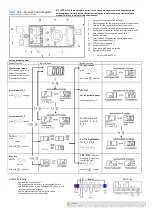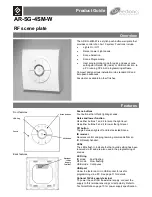
MIA-M10Q - Integration manual
ready feature with a message output rate of less than once per second, and fetching data only when
available, determined by the TX_READY pin becoming active.
2.4 Antenna
This section explains the antenna supervisor feature and the available implementation options.
2.4.1 Antenna supervisor
An active antenna supervisor provides the means to check the antenna for open and short circuits
and to shut off the antenna supply if a short circuit is detected. Once enabled, the active antenna
supervisor produces status messages that are reported in NMEA and/or UBX protocols. MIA-M10Q
supports two antenna supervisor variants: three-pin and two-pin implementations. The three-pin
antenna supervisor is able to detect short and open circuits. The two-pin antenna supervisor is a
reduced version of the three-pin antenna supervisor and is only able to detect short circuits. An
overview of the two antenna supervisor variants is given in
. It is recommended to make
use of the full capabilities of the antenna supervisor (detect open and short circuits, and control the
antenna supply).
The antenna supervisor can be configured through the CFG-HW-ANT_* configuration items. This
includes enabling and disabling as well as changing the polarity of each signal. The current
configuration of the active antenna supervisor can also be checked by polling the related CFG-
HW_ANT_* configuration items.
The active antenna status can be determined by polling the UBX-MON-RF message or checking
the NMEA notice messages. If an antenna is connected, the initial state after power-up is “Active
Antenna OK" in the UBX-MON-RF message.
Features
Short detection
Yes
Yes
Open detection
Yes
No
External components
Discrete and IC
Discrete and IC
Number of PIOs needed
Three
Two
Table 14: Antenna supervisor overview
2.4.1.1 Three-pin antenna supervisor
An active antenna supervisor circuit uses the ANT_DETECT, ANT_OFF_N, and ANT_SHORT_N
signals. The ANT_OFF_N signal is already enabled and assigned to the LNA_EN pin in MIA-M10Q.
The ANT_DETECT and ANT_SHORT_N signals can be assigned to any unused PIOs, which may
require disabling the previous function of the PIOs. For example, the open circuit detection uses
the ANT_DETECT signal, "high" = Antenna detected (antenna consumes current); "low" = Antenna
not detected (no current drawn). To enable the three-pin antenna supervisor, the ANT_DETECT
and ANT_SHORT_N signals must be enabled in the receiver configuration. The polarity of the
ANT_DETECT and ANT_SHORT_N signals must also be defined in the receiver configuration based
on the design use case.
The antenna can be supplied by VCC_RF or an external supply. Note that the supply voltage must
be clean, as any noise could directly couple into the RF part of the GNSS receiver which will affect
the overall GNSS performance.
for antenna supervisor examples and the required configuration.
presents the required three-pin antenna supervisor circuit and subsequent sections
describe how to enable and monitor each feature.
UBX-21028173 - R01
2 Receiver functionality
Page 27 of 89
C1-Public
















































